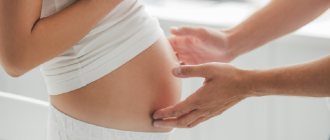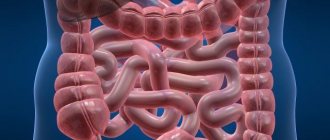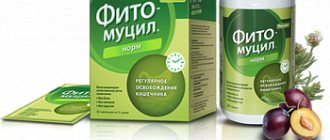Every person has encountered diarrhea: it is, of course, an unpleasant phenomenon. Diarrhea (or diarrhea) is loose and frequent stools, which is sometimes accompanied by other symptoms - nausea, vomiting, general weakness and fever. If there are no special health recommendations, then dealing with diarrhea is not so difficult. But what should pregnant women do, for whom most medications are prohibited (especially in the first trimester)? And how dangerous is diarrhea in pregnant women for the unborn child and his mother?
Causes and symptoms of diarrhea during pregnancy
Infectious.
The cause of intestinal dysfunction can be bacterial and viral infections (for example, norovirus or rotavirus). They are usually transmitted through the air or the fecal-oral route. Pathogenic microorganisms also often enter the gastrointestinal tract when consuming low-quality foods or contaminated water. Infectious diarrhea during pregnancy in the second and third trimester may be accompanied by fever, chills, nausea and vomiting, painful abdominal cramps, and general weakness. An admixture of mucus often appears in the stool.
Non-infectious.
This form of diarrhea can be caused by a variety of factors: changes in diet, frequent stress, disturbances in the processes of digestion and absorption, certain chronic diseases, and taking certain medications. In this case, the pregnant woman may be bothered by frequent bowel movements (sometimes with imperative, i.e., strong, irresistible urges), abdominal pain in the upper or lower section. With organic lesions of the colon, an admixture of blood sometimes appears in the stool. In later stages, disturbances in the frequency of bowel movements may be associated with fetal pressure on the gastrointestinal tract.
Up to contents
Food poisoning
Vomiting and diarrhea during pregnancy may indicate the onset of labor
Signs of food poisoning appear very quickly. Nausea, vomiting, diarrhea are the main symptoms of food poisoning. Flatulence and fever can also accompany poisoning.
Intoxication of the whole body occurs, which is accompanied by weakness, chills, and headache. Even fainting may occur due to a decrease in blood pressure.
Food poisoning is accompanied by dehydration and can be very dangerous as it causes blood to thicken. This condition can provoke thrombosis and varicose veins, and the threat of miscarriage.
Food poisoning is especially dangerous during the period of 36-39 weeks, since the woman’s body is weakened and it is not easy for the immune system to cope with the negative load. Usually only the pregnant woman suffers from the manifestations of food poisoning; the child practically does not feel this condition.
Only in case of dehydration is the child's health at risk, since this condition reduces blood circulation. This in turn leads to a lack of nutrition through the placenta and the production of the corresponding hormone, which can provoke the threat of miscarriage. Therefore, food poisoning must first be treated by replenishing the lost fluid in the mother’s body.
Diagnostic features
When diagnosing the disease that caused diarrhea, it is important to exclude surgical, urological and obstetric pathologies. To do this, an examination is required; if necessary, the doctor prescribes additional examination. Diarrhea in the early stages can be a manifestation of ectopic pregnancy, appendicitis, urinary tract infections, pyelonephritis, inflammatory bowel diseases, acute pancreatitis. That is why it is important to promptly establish the cause of intestinal dysfunction and select adequate therapy. Monitoring (monitoring) of the condition of the fetus at 37, 38 and 39 weeks of pregnancy is also mandatory.
Up to contents
Consequences of diarrhea in the early stages
Prolonged diarrhea can lead to dehydration, a condition that is dangerous for both the expectant mother and the fetus. It is manifested by severe weakness, dry mucous membranes, and thirst. Severe dehydration may affect cardiac and respiratory function. Diarrhea can also, in some cases, increase the risk of miscarriage due to increased contractile activity of the uterus and can lead to disruption of uteroplacental blood flow.
Up to contents
Preventive actions
Diarrhea, also with cramps and pain, during pregnancy is an unpleasant thing. Therefore, it is better to prevent it than to treat it later. Prevention measures:
- Personal and public hygiene.
- Buy only high-quality and fresh products.
- Eat only fresh food. Forget about semi-finished products and “finishers”, especially during the holidays. Yesterday's Olivier can cause a lot of trouble.
- Follow the cooking rules - rare meat and soft-boiled eggs should be forgotten during pregnancy.
- Catering is not prohibited, but it’s not worth the risk.
- Forget about crowded places during epidemic periods.
- Do not use unproven methods of treatment, including traditional ones. If diarrhea lasts more than a day, or the situation worsens, you should immediately consult a doctor.
Remember! Not only your health, but also the life of the future toddler depends on your decisions!
Directions of treatment
The doctor must decide how to treat diarrhea, taking into account the woman’s condition, the cause of indigestion, the duration of pregnancy and other factors. Typically therapy includes the following areas.
| Restoration of water and electrolyte balance | Replenishing fluid deficiency in pathologies accompanied by diarrhea is an important measure to prevent severe and life-threatening conditions. To restore water and electrolyte balance, pregnant women, on the recommendation of a doctor, can drink still mineral water or rehydration solutions. The latter contain salts necessary for the body, which are removed from it along with the liquid. It should be borne in mind that if you are severely dehydrated, drinking a salt solution may no longer be enough. In this case, rehydration drugs are infused intravenously (in a hospital setting, if recommended by a doctor). |
| Detoxification | To reduce the burden on the body, it is necessary to help it get rid of toxic substances. In some cases, gastric lavage is performed for this purpose. You can also take enterosorbents strictly as prescribed by your doctor. These drugs, passing through the gastrointestinal tract, can bind toxic substances and promote their removal from the body naturally. By themselves, such drugs do not interact with the mucous membrane of the intestine or other parts of the digestive tract. |
| Restoration of normal intestinal microflora | To normalize the processes of digestion and absorption, it is necessary that beneficial bacteria be present in the intestines. They can be obtained through food (for example, fermented milk products with live cultures). In addition, according to indications, the doctor may prescribe probiotic drugs that help restore the intestinal microflora. |
| Eliminating the cause of diarrhea | If frequent bowel movements are a symptom of a bacterial infection, antibacterial medications may be used for treatment. Such remedies can help eliminate the cause of diarrhea by destroying pathogenic microorganisms. The drugs are used strictly as prescribed by the doctor. |
Up to contents
How to deal with heartburn
You can eat the following foods:
- protein;
- pureed and boiled vegetables;
- baked apple;
- yogurt;
- 1 tsp. honey in a glass of warm milk (not for those who are allergic to honey and/or milk);
- lean meat.
You should not eat:
- fatty and salty foods;
- pickles, smoked foods, sauces, vinegar, seasonings;
- sour fruit juices and compotes;
- citrus;
- tomatoes;
- coarse fiber (white cabbage, onions, garlic, radishes);
- mushrooms;
- black bread;
- chocolate; coffee;
- strong hot tea;
- soda.
The decision to prescribe a drug that can alleviate the symptoms of heartburn should be made only by a doctor. Discuss your condition, frequency and intensity of symptoms with him. Don't self-medicate!
When is hospital treatment required?
It is not always possible to treat a disease accompanied by diarrhea at home. In case of severe dehydration, risk of miscarriage, or severe concomitant diseases, the doctor may suggest that the pregnant woman go to the hospital. This measure allows for constant medical supervision, which in such cases is often simply necessary. Urgently seeking medical help and emergency hospitalization may be necessary if:
- severe abdominal pain of any localization;
- blood in stool;
- general lethargy.
The standard clinical indications for inpatient treatment are moderate to severe diarrhea accompanied by dehydration. It is also necessary to go to the hospital if therapy at home for 3-4 days does not produce results (the pregnant woman does not get better, symptoms persist).
Important! Even in an outpatient setting, treatment of conditions accompanied by diarrhea should be carried out under the supervision of a physician.
Up to contents
What should cause concern
With diarrhea, a change in the color of the stool may occur.
If the toilet has become a friend, but there are no additional alarming signs, then diarrhea can be corrected with diet.
Emergency hospitalization is indicated if a pregnant woman experiences the following symptoms:
- faintness, weakness;
- the presence of impurities, blood, black or too light color of stool;
- unquenchable thirst;
- drying of the oral mucosa;
- dark circles under the eyes;
- decreased urine output and dark coloration.
Diet
When treating diarrhea, it is very important to adjust your diet to reduce the load on the digestive tract and help the body cope with the problem faster. In case of intestinal dysfunction, accompanied by frequent bowel movements, spicy, sour, and fatty foods are excluded from the diet. If you have an intestinal disorder, you should not consume whole milk, fresh fruits and vegetables, legumes, sweets, spices, or smoked snacks. Liquid, semi-liquid, pureed and steamed foods are allowed. They should be served warm, but not hot or cold. In the first days of infectious diarrhea, experts may recommend following a fasting diet. Then rice water and liquid porridge made from oatmeal or buckwheat are introduced into the diet.
Up to contents
How to avoid gas formation
General recommendations for reducing and, if you're lucky, preventing gas formation are as follows:
- avoid or limit the consumption of foods and liquids that traditionally cause flatulence - legumes, cabbage, zucchini, carbonated drinks - and those that have a similar effect on you;
- do not eat fatty fried foods;
- drink from a glass without using a straw;
- avoid tight, tight clothing around the waist;
- eat small meals 5-6 times a day;
- give yourself physical activity, do exercises for pregnant women;
- limit or eliminate artificial sweeteners;
- drink more fluids;
- eat slowly, chewing your food thoroughly.
The last point is one of the most reliable ways to combat flatulence. Basically, gas is caused when the bacteria that lives in the intestines and is responsible for breaking down food that has not been thoroughly chewed by you and digested by enzymes in the stomach does not have time to cope with its function.
Increased gas production does not cause any harm to your baby. It may bother you a lot, but he doesn’t care at all. Therefore, concentrate on consuming foods that have high biological and energy value, which will provide you and your baby with all the necessary vitamins.
In conclusion, we would like to remind you of the principles of healthy eating during pregnancy, which are advisable to adhere to in order to prevent or alleviate digestive problems.
Is it possible to use IMODIUM® Express in early pregnancy?
IMODIUM® Express is an antidiarrheal drug in the form of lozenges. The active substance of the drug is loperamide, which has no data on its teratogenic or embryotoxic effects. However, the drug cannot be used at any stage of pregnancy. According to the instructions, use is not allowed in the first trimester and during breastfeeding1. In the second and third trimesters, IMODIUM® Express can only be taken on the recommendation of a doctor1. An antidiarrhea drug is prescribed only if the expected benefit to the woman outweighs the risk to the fetus. Before use, you should consult a specialist and read the instructions.
The information in this article is for reference only and does not replace professional advice from a doctor. To make a diagnosis and prescribe treatment, consult a qualified specialist.
1 According to the instructions for medical use of the drug IMODIUM® Express.
* Among products based on Loperamide. Based on sales in money for February 2022 - January 2022, according to IQVIA (from English IQVIA).
How to treat diarrhea during pregnancy
Ideally, a doctor should prescribe treatment for a pregnant woman. If for some reason going to the hospital turns out to be impossible, then self-administration of medications that are safe for pregnant women is allowed. Among them:
- Regidron;
- Smecta;
- Activated carbon;
- Entergosgel.
It is important to understand that these drugs can be used only after thoroughly studying the instructions, and only when the diarrhea is not severe and does not cause much concern. In the serious cases described above, self-medication is strictly not recommended.










